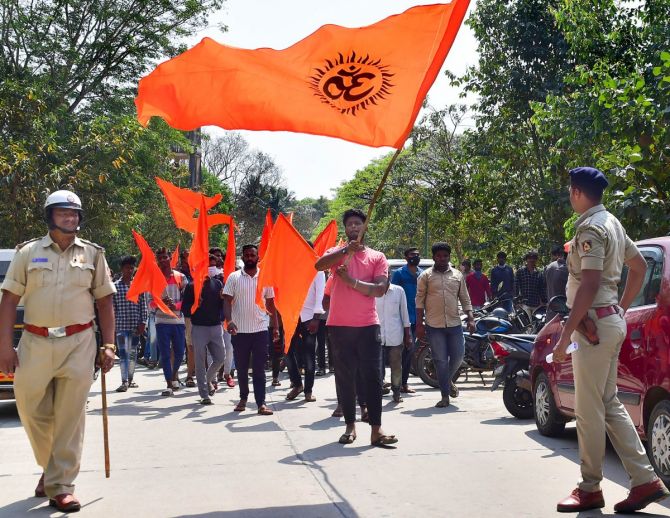'Segregation suits the BJP at the moment. It will not suit them forever.'

It all started in a college in Udupi, now it has spread to not just other parts of Karnataka, but many other places in India too.
The incident was detaining students wearing the hijab from entering the pre university college campus as the authorities felt it was against the uniform prescribed by the institution.
'If you let Muslim students wearing hijab in, we will go in wearing saffron shawls', threatened some aggressive Hindu students backed by Hindu outfits.
Where will this lead to?
"The question of bindis, caste marks, wearing of the cross, etc have also been brought up. And rightly so, perhaps. But if you are going to change all this, it is going to create endless problems... especially, segregation, I'm afraid," Prakash Belawadi, the well known activist and media personality from Karnataka, tells Rediff.com's Shobha Warrier.
The first of a two-part interview:
Do you think what we witnessed in Udupi was due to the tension that has been brewing between the Hindu and Muslim communities in Karnataka for some time?
We have to honestly confront two aspects behind this incident: First, there is no doubt about the fact that there is a rise of Hindutva sentiment in the country.
It may be more pronounced in the BJP ruled states than the non-BJP ruled states.
The Narendra Modi regime certainly contributed to this narrative by candidly siding with Hindutva sentiments, but it would be prudent for us to assume that the rise of Narendra Modi in itself, as well as the new politics of India, are a result of the shift of mood in the public towards this kind of sentiment.
You mean, a majority of Hindus have this kind of a sentiment now?
Majority is a very troubled word. No government in India has been a majority government in India since Independence, in terms of vote share.
So, when you say majority of the Hindus, it becomes even more complex than that.
There are many categories of Hindus who don't even call themselves Hindus.
There are sections of Brahmins who say Sanatana is not the same as 'Hindu'.
But yes, there may be a danger in thinking that because of Narendra Modi, there is a rise in Hindu sentiment.
But the truth is, it is because of the rise of Hindutva that Narendra Modi got pushed up.
Let's not forget that he was not desired by anybody in the top BJP leadership. Nobody, starting from Advani, wanted him at the top.
So, within the BJP and the Sangh Parivar set up itself, Narendra Modi was democratically elected.
There was a tremendous pressure from within the BJP to make him the prime ministerial candidate.
There was a rising sentiment for him among the public.
People saw in him the catalyst for this change of sentiment.
That's why there has been very little open criticism of his doing pujas at Varanasi or laying the foundation stone for some temple somewhere.
There has been silence before too, when you had elected representatives, especially at the top, declaring their allegiance to a particular faith, in some form or the other.
We face a dilemma now. For example, when the BJP's declared manifesto is Hindutva and Hindutva makes the cow sacred, the controversies surrounding beef were bound to happen when it rose to power.
You are going to have the same problem with the Uniform Civil Code as well, because it is there in Article 44... 'the state shall endeavour to secure a Uniform Civil Code for the citizens throughout the territory of India.'
Now, regarding wearing of the hijab, which side of the argument is right is not the question.
In the moral zone, the question is not answered.
The whole point of having uniforms in schools is that there should not be any social class difference felt by children in a classroom.
The question of bindis, caste marks, wearing of the cross, etc have also been brought up. And rightly so, perhaps.
But if you are going to change all this, it is going to create endless problems... especially, segregation, I'm afraid.
The uniform was to prevent segregation, but a new virulent segregation could happen now.
All this because we have not addressed these time bombs that are in the Constitution.
When the Constitution was framed, the leaders might have realised that India was at a fragile State than to attempt any resolution of these issues.
Maybe the idea then was to allow the pluralism and other complexities of India to find an equilibrium.
Even today, is the situation not fragile and sensitive?
It is worse today. When you say minorities, the Constitution does not indicate religious minorities alone. It could be linguistic minority too.
In principle, the Constitution accepts that Hindu society has divisions because of caste.
And the Constitution schedules some of these castes so that they could get preferential treatment within the Hindu system.
So, Hinduism becomes a definition by default; it has no single book, it has no church, it has no single dictum, it has no single guru.
So, to use the word Hindu majority is not at all valid. The very idea of majority is very complex.
Within the BJP set up, the OBCs now seem to have an upper hand.
So, it is not easy to define the word majority.
Even political parties understand that there is no unified Hindu society.
What is worrying about the hijab issue is that everyone looks for political capital from this.
Who is going to benefit from this controversy?
My answer is simple. I have no doubt that it will be the BJP and Sangh Parivar that will benefit.

It means they are able to divide the society on religious lines...
When you divide society into 50-50, you will not know who will benefit from it.
But if you polarise society by 80-20, certainly the BJP will benefit.
Even the completely neutral people in India will not send their children to the schools or colleges where they would have to wear their religious identities.
Even if they are very devout people at home, they may not want their children to wear any religious garb.
I certainly would not send my children to such an institution.
But it will be very difficult to enforce such a dress code in private schools and colleges.
You can make a law, but how will you make it work? Even if the court rules that a school or a college should allow wearing of some religious garb, a private institute can circumvent the law by raising a million barriers to see that it will not happen there.
The obvious result of this controversy will be segregation. And segregation suits the politics of the BJP at the moment. It will not suit them forever.
Feature Presentation: Aslam Hunani/Rediff.com











 © 2025
© 2025